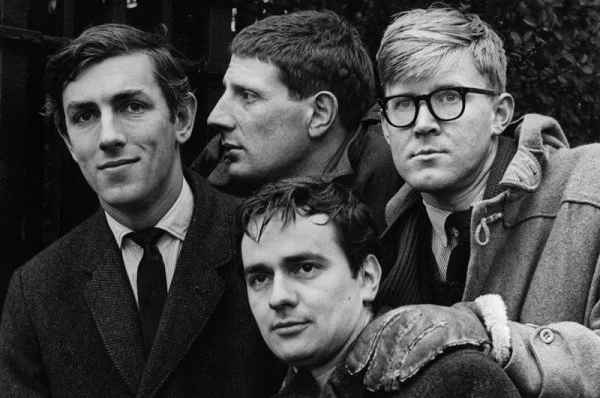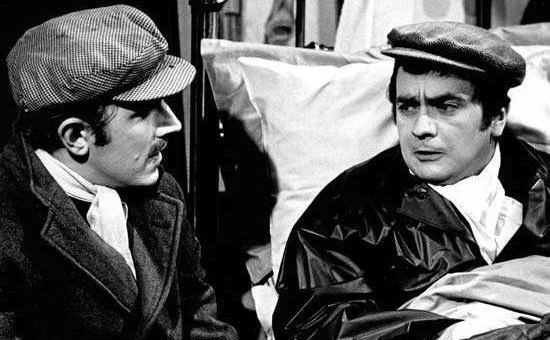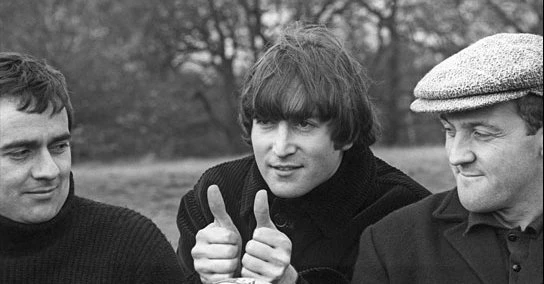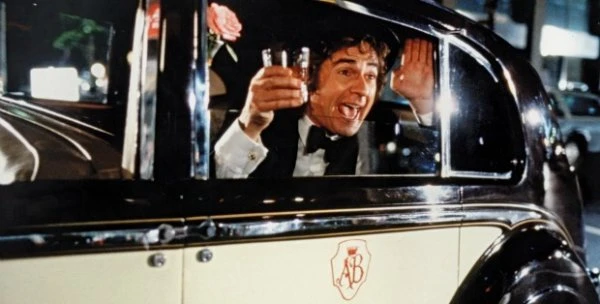
Dudley Moore
Dagenham may have launched many a motor car over the years, but in 1935 it produced its most famous export – a man whose humble beginnings were an unlikely precursor to the worldwide adulation he would attain. That man was Dudley Moore.
Hailing from a Dagenham housing estate, Dudley had a traditionally troubled childhood that befalls many children who have a visible difference to their peers. In his case, it was in the form of a club foot. It was a feature that Dudley would be hampered by in his formative years, with extensive treatment correcting his right foot but not his left, and which would lead to him turning to humour to prevent the seemingly inevitable bullying that would follow. Dudley would retain an unease about his physical affliction throughout his entire life.
After attending the Guildhall School of Music, Dudley Moore was awarded a scholarship to Oxford. It was not a common occurrence for Dudley’s area, and he proudly recalled his Mum, ‘running down the road shouting “My son’s going to Oxford!”’ The scholarship Dudley had attained was in music, but despite his talents as a musician he would find himself falling in with three future comedic geniuses in the form of Alan Bennett, Jonathan Miller and Peter Cook.

Dudley Moore provided the musical entertainment as the quartet honed their stage act…his musical segments a parody of famous classical compositions. The show the four of them took to the Edinburgh Fringe, Beyond The Fringe, proved a phenomenal success and they found themselves performing it on the West End and in New York as their careers took off spectacularly.
For Dudley, as much as he admired the work of his three colleagues, the one that he found the greatest connection with was Cook, and it was the pair of them that would raise the bar of British television sketch comedy. When the BBC decided that Dudley’s musical parodies would make a solid base for a television show, Dudley himself was less convinced. Not Only…But Also was intended to reflect that the show was not only Dudley Moore, but also a guest star. As such, Dudley brought Peter Cook in for the opening episode, somebody he was by now used to working with. His insecurities addressed, the show was a huge success and so the BBC decided to retain Cook, ensuring the double act of Pete & Dud was somewhat inadvertently created.

Not Only…But Also lasted for three series and a Christmas special, but the pair would remain linked for the rest of their careers. Most notable within their television success were the sketches known as the Dagenham Dialogues. Here, Pete and Dud would discuss particular situations in their life. Not unlike the dynamic of Laurel and Hardy, we are treated to the ramblings of one idiot, and another who adopts the attitude of the superior intellect but is actually no wiser than his diminutive friend. The highlight of these sketches were undoubtedly Dudley’s inability to deliver the material without collapsing into laughter, normally intentionally drawn from him by Cook.

Cook and Moore were hot stuff in the television world, and they went to Australia to replicate the success of Not Only…But Also down under. They further cemented their reputation by branching into cinema, most notably with Bedazzled, Cook starring as the Devil opposite Moore as he tries to trade wishes in return for the latter’s soul.

The relationship Moore had with Cook would sour when Dudley struck gold in Hollywood. In 10 and Arthur he attained worldwide solo fame and even an Academy Award nomination for his portrayal as the millionaire drunk playboy Arthur Bach. Cook and Moore would have a difficult relationship, but it was one that would never go away. But Dudley’s Hollywood fame did go away. Having scored such successes with two remarkable comedies in such a short space of time, repeating those successes proved impossible. Some movies would be passable, but most would flop, despite Dudley’s best efforts, and he found himself retreating more and more into his music.
During the years when film success eluded him, Dudley remained a regular favourite on television chat shows. In many ways these were the perfect vehicle for him. His loveable character and playful demeanour meant that the warmth the British public maintained for him went unaffected by his defection to the other side of the Atlantic, and such shows rarely went by without an interlude at the piano.

With Dudley unable to find success in Hollywood, he returned to the small screen and his music for solace. Such was his musical passion that British television audiences saw him in a light they had not previous been exposed to. Two successful programmes, Orchestra and Concerto, aired on prime-time Channel 4 to much critical acclaim. In many ways, Dudley was now having the best of both worlds – performing where he was most at home, with his music, while gaining favourable reviews to provide him the acceptance he craved.
His comedic talents and playfulness were by now rarely seen however, and in America his two attempts to return to television comedy failed badly. Dudley and Daddy’s Little Girl were both axed before the end of their respective runs having attained poor reviews and viewing figures, but Dudley wasn’t overly concerned about the possibility of the shows remaining episodes being picked up, telling lifelong friend Peter Cork and music master from Dagenham High School, ‘it certainly would be unwelcome…since it was the most hard thing I have done in my life.’

In later years, Moore disappeared from our screens as ill-health took control of his life. A rare brain disease, undiagnosed at the time, initially sparked speculation that Dudley had an alcohol problem as he struggled to remember lines, spoke with a slur and most worryingly for him, struggled while at the piano. Once the diagnosis was made, Dudley largely disappeared from public life altogether, aside from collecting his MBE in 2001.
Dudley Moore was a rare commodity indeed. The work that survives of his television material with Peter Cook stands the test of time extremely well, while his best movies and music compositions compare better than most of his contemporaries. Despite all of that though, most fans will remember him for his charm, unmistakable giggle and playful naughtiness…Cuddly Dudley was a one off.
About the writer of this biography: Brian Slade
Born and raised in Dorset, Brian Slade turned his back on a twenty-five-year career in IT in order to satisfy his writing passions. After success with magazine articles and smaller biographical pieces, he published his first full-length work, `Simon Cadell: The Authorised Biography'.
Brian is a devoted fan of the comedy stars of yesteryear, citing Eric Morecambe, Ken Dodd, Harpo Marx and Dudley Moore amongst his personal favourites. He was drawn to the story of Simon Cadell through not only `Hi-de-hi!' but also `Life Without George', a programme he identified with having grown up in the Thatcher era.
Published on December 12th, 2019. Written by Brian Slade for Television Heaven.









